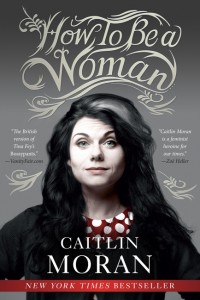 Because it’s my book club selection for this month, I picked up How to Be a Woman by Caitlyn Moran with a certain amount of whimsy. Not really knowing what to expect but seeing the book sell like hotcakes over the last few months, I wasn’t sure it was going to be a book for me. It’s funny, irreverent, honest, and ballsy, and there were parts that I earmarked because I found them so compelling (in particular how everyone, man, woman, child, needs to stand on a chair and scream: I AM A STRIDENT FEMINIST; and that the biggest fault of humanity at the moment is that we’re simply just not polite enough full stop), but overall, I have some reservations about the book (I mean, of course I do).
Because it’s my book club selection for this month, I picked up How to Be a Woman by Caitlyn Moran with a certain amount of whimsy. Not really knowing what to expect but seeing the book sell like hotcakes over the last few months, I wasn’t sure it was going to be a book for me. It’s funny, irreverent, honest, and ballsy, and there were parts that I earmarked because I found them so compelling (in particular how everyone, man, woman, child, needs to stand on a chair and scream: I AM A STRIDENT FEMINIST; and that the biggest fault of humanity at the moment is that we’re simply just not polite enough full stop), but overall, I have some reservations about the book (I mean, of course I do).
Moran is a natural writer–you feel like her thoughts flow so smoothly from her mind to her fingers, and that they don’t get all caught up in between as mine sometimes do. And she has convincing arguments, namely about the fact that feminism has gotten lost in terms of the idea of equality–or, rather, the perception of the “achievement” of equality, and young women left, right and centre, are declaring themselves “not” feminists primarily because they have absolutely no idea what they’re talking about. She also rails against sexism, the lack of hair on female anatomy, revolutions in music (and then back again), and much, much more. There are obvious holes to her arguments, that come across more like opinions than rational, thought-out perspectives, but that doesn’t make the book any less impactful.
I like smart, sassy women who aren’t afraid to use words that make me blush even thinking about them. I like strong, opinionated women, too. But to say this is a book about ‘feminism’ might just be a bit of a misnomer. It’s a book about Moran’s own brand of feminism, about conclusions she’s drawn, and the hopes and opportunities she has for our gender. Throwing in statistics and quoting the hell out of Germaine Greer doesn’t necessarily a feminist tome make. I laughed out loud in many places, especially during the beginning bits of the book–the fevered pitch of her writing is charming, and her early life’s eccentric enough to make for truly entertaining reading. Yet, as I turned page after page, I kept thinking that Moran’s a woman who knows her own mind extremely well. She’s confident in her decisions, in her thoughts, in her position in the world–it’s a feminist position, absolutely, and as a feminist myself, I appreciate every word she says. Knowing your own mind is one thing, but it’s not a universal thing, and I guess that’s what was missing from this book–feminism as it relates to Moran isn’t necessarily a prescription to fix many of the problems in the world, but it’s most certainly not a bad place to start, either…
I have seen this book around but I haven’t felt the need to rush out and get my own copy…